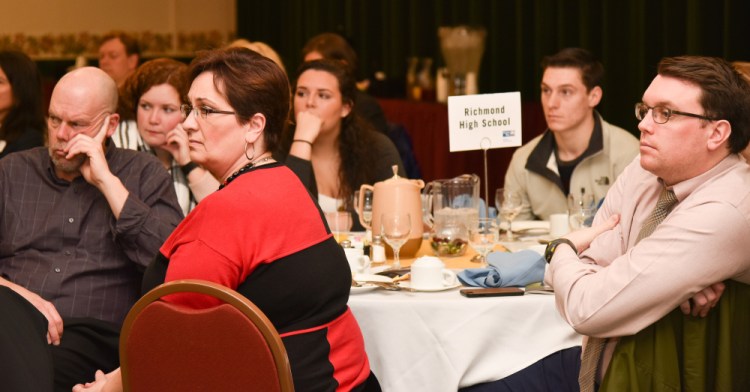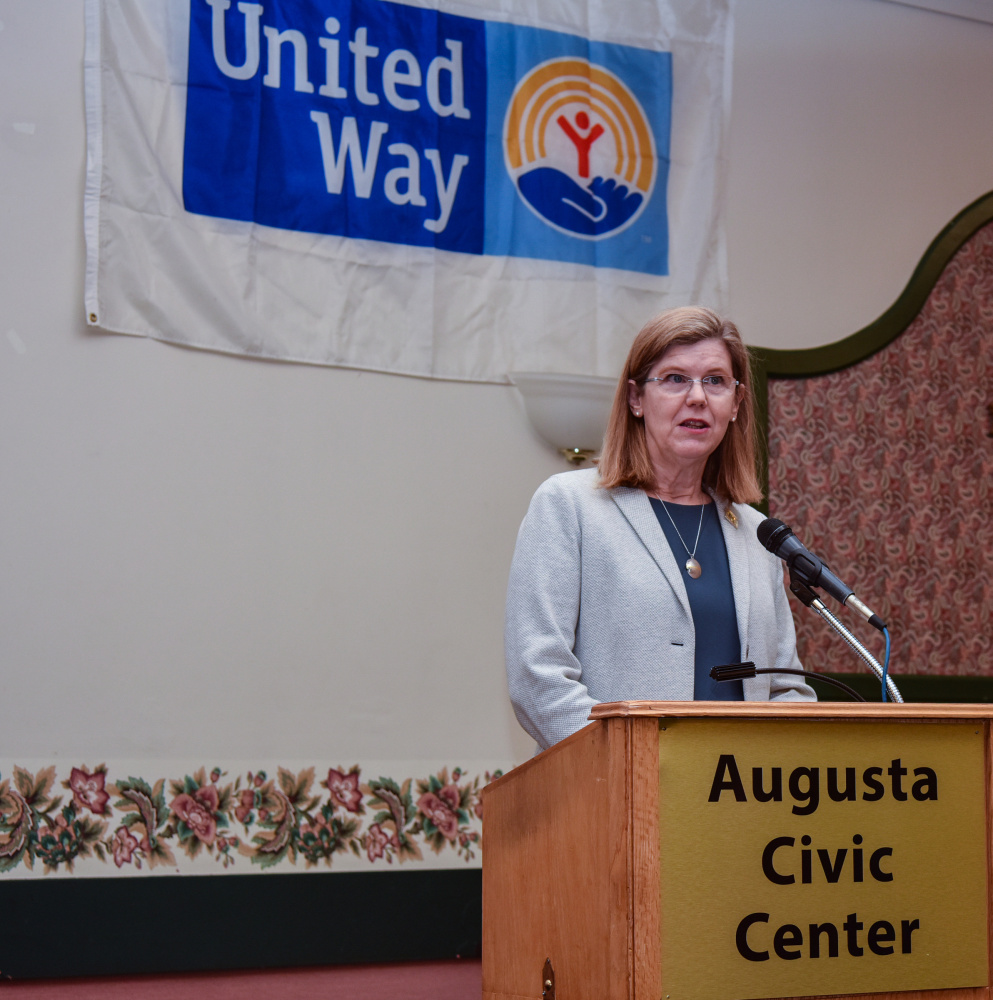AUGUSTA — Reducing the stigma associated with opiate addiction is critical to the willingness of a person to access treatment.
Emilie van Eeghen, the vice president for behavioral health at MaineGeneral Medical Center in Augusta, shared that message with more than 100 people during the United Way of Kennebec Valley’s annual breakfast Thursday morning. Van Eeghen said recovery is possible and resources are available to those in need.
“Stigma contributes toward the difficulty (an addicted person) has in engaging in recovery,” van Eeghen said. “We can change how we respond to stigma and be alive to the hope of recovery and the possibilities of our strong community.”
Van Eeghen spoke for almost 20 minutes about the opioid crisis in Maine and said when she started at MaineGeneral 30 years ago, she was primarily concerned about alcohol addiction. It wasn’t until about 10-15 years ago that she started to see an increase in opioid dependency, and now, it’s an epidemic.
“Anyone can be addicted,” she said. “Men and women, young and old. Businesspeople, lawyers, health care professionals, construction workers or volunteers.”
Statistics released Thursday by Attorney General Janet Mills showed 378 people died of a drug overdose in 2016, more than 100 more than the previous year. Of those deaths, Mills said, 313 were the result of either a pharmaceutical or non-pharmaceutical opioid. In 2015, there were 272 drug overdose deaths in Maine, and Mills said the 39 percent increase is due mainly to the influx of illicitly manufactured (non-pharmaceutical) fentanyl and fentanyl analogs. Fentanyl is a synthetic opioid that is 80 times more potent than heroin.
During the United Way talk, van Eeghen said people from all walks of life are impacted either directly or indirectly by opioid addiction. She became emotional as she shared the stories of a young woman who first experienced opioids when she was 8 and was given pills by her mother to keep her quiet while her stepfather and grandfather abused her. Or the young man who began taking opiates are a young child to deal with the violence he was experiencing at home.
Kennebec and Somerset county District Attorney Maeghan Maloney said it always hurts to hear those stories, but she noted the importance of making sure the stories are told.
“Hearing people’s stories is so important so we don’t marginalize them or push them to the side,” Maloney said. “We need them to be a part of our society, and we need to figure out a way to bring them back.”
Maloney said she can sense the stigma surrounding opioid addiction is starting to change. In her office, she tries to make sure she and her staff think about the terminology they use when writing court documents. Instead of calling someone an addict, she said they’ll say the person is addicted to a specific substance.
“It’s a small change, but it’s an important change in the way we’re thinking about this problem,” she said.
Van Eeghen said the United Way does a lot of things on many different levels to help fight the epidemic. Not only does the organization fund several programs across the addiction spectrum, but they also help fund social service programs, like shelters and food banks, that an addicted person might be lacking but is essential to the recovery process.
“Everyone has a part to play in changing the picture that I just painted,” van Eeghen said. “It’s most important to know that the hope of recovery is there, and we all must come together to make that happen.”
Community forums were in held Augusta, Gardiner and Winthrop and other municipalities last year to try and address the problem.
In late August, a forum held at the Boys and Girls Club of Greater Gardiner focused on reducing the stigma associated with drug addiction. Increasing the community’s understanding of the impact of substance abuse and educating the community about the impact that adverse childhood experiences and trauma have on substance abuse is one way to do that, said Joanne Joy, the executive director of the Healthy Communities of the Capital Area organization, at the forum.
One Augusta forum focused on the link between poverty and substance abuse, and two in Winthrop spoke to the complicated causes and effects of the current epidemic of opiate abuse.
Another part of changing the stigma, van Eeghen said, is by educating people about addiction and what makes someone become addicted to opioids. The clinical definition of addiction, she told the captivated audience, is a chronic relapsing brain disease characterized by compulsive use despite harmful consequences.
Too often, she said, people think that someone who is addicted can just stop. It’s true that most people started voluntarily, but once they’re into addiction, stopping isn’t possible without treatment, she added.
“Addiction is a lifelong disease that can be managed in a way that recognizes recovery as an ongoing process,” she said. MaineGeneral, she said, is engaged in multiple strategies and efforts to fight the crisis, from needle exchange programs to providing overdose reversal kits to those with addiction and local law enforcement agencies.
She said the whole community needs to engage in an effective response to this epidemic. The most important thing, she added, is that people who are addicted know that the hope for recovery is there.
Rob Gordon, the local United Way chapter’s executive director, said the organization is filled with volunteers and other people who care about others.
“We are living in a challenging time,” he said. “I trust that we all have the capacity and empathy for people in need that leads us into action.”
In other business, Richmond Middle/High School English teacher Gary Carter and several students spoke about the United Way’s Day of Caring. Carter said the program helps students give back to the community that has given so much to them.
“Relationships are the most important things,” Carter said. He said the school has received more than $20,000 worth of materials in the last several years, so the Day of Caring is how his students can give thanks.
Jason Pafundi — 621-5663
Twitter: @jasonpafundiKJ
Send questions/comments to the editors.






Comments are no longer available on this story